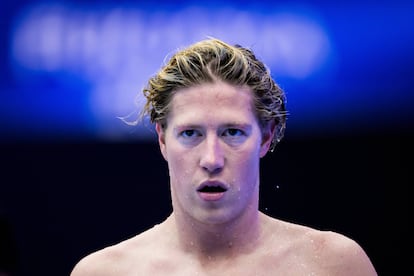The ‘muffin man’ or how the internet has shone a light on lesser-known Olympic athletes
Norwegian swimmer Henrik Christiansen has gone viral at the Paris Games, not for winning a medal, but rather for his love of a chocolate treat

There is a Norwegian swimmer at the Paris Olympics who is more famous for eating chocolate muffins than for his sporting successes. His name is Henrik Christiansen. He failed to qualify for the 800- and 1,500-meter freestyle finals and is competing in the six-mile open water race in the Seine on Friday. But that’s not what has grabbed attention.
In a TikTok video posted on July 25 — before the opening ceremony — he rated several meals in the Olympic village. The Chinese ravioli were better at the Tokyo Games, he says, while the pasta with pork was “solid”: a 7 out of 10. But the chocolate muffin got an 11 out of 10. Since that day, Christiansen has been known as the “muffin man,” the most famous athlete without a medal on TikTok.
@henrikchristians1 Olympic Village food review! A little surprise at the end too! Smash like and subscribe for part 2✌🏻 #fyp #olympics #paris2024 #olympictiktok #olympicvillage #foodreview @Olympics @paris2024 @Mr.Nicho
♬ original sound - Z7duckx_Music - Z7duckx_Music
Christiansen has nearly half a million followers on TikTok. Up until a few days before the Games, he barely posted videos. He began by sharing the typical videos of the Olympic uniforms and the trip to Paris. Until he discovered the muffins. Since then, he has recorded more than a dozen about the chocolate muffins at the Olympic Village, which have racked up millions of views.
His success on TikTok is not by chance. Christiansen has an upbeat approach and his videos use typical TikTok tools, such as dubbing with audio memes, and are very funny. Christiansen told The New York Times that as a teenager he had to decide between swimming and theater, two activities he both really enjoyed. (The swimmer also said that, despite being an athlete, he can eat lots of calories because he burns more than 7,000 in the pool on training days.)
@henrikchristians1 Spent på om denne når ut til et internasjonalt publikum @Tigergutt #fyp #tigergutt #olympics #paris2024 #olympictiktok #olympicvillage #muffins
♬ Se på meg - Tigergutt101
Christiansen’s popularity is the best example of the slow transition from consuming big events on TV and focusing on the champions to a more niche approach, where not everything depends on winning medals. For now, this is a different, secondary category, although it continues to grow. Medals still count more, but there is a large group of people, who are perhaps less interested in sports, but more active when it comes to memes and jokes about the Games.
A total of 80% of the potential audience aged 15 to 45 were planning to watch content from the Paris Games on social media, according to a survey by the United Talent agency, which represents athletes and content creators. What’s more, 72% were more keen to see behind-the-scenes videos at the Paris Games than at the previous Tokyo Games in 2021.
@itsdanielmac Casually Meeting The Actual Goat 🥹 #parisolympics #olympics #michaelphelps #parisolympics2024 @NBC Olympics & Paralympics @TikTok
♬ original sound - DANIEL MAC
The official U.S. broadcaster of the Olympics, NBC, brought 27 content creators with its delegation to make backstage videos in the Olympic Village. Perhaps the most famous of this group is TikToker Daniel Mac, who started on the platform by asking luxury car owners what they do for a living. At the Olympics, he has been asking the same question — only to sports stars like Michael Phelps, the most decorated athlete in history: “Nothing anymore,” he replied to Mac, who has 14 million followers on TikTok. “I’m a dad,” he added.
@ilonamaher Opening ceremony fit @Ralph Lauren @Team USA @paris2024 @Olympics #olympics
♬ original sound - (taylor’s version)
But these creators already have a following. The Olympic Games are, however, an ideal springboard for athletes like Christiansen, who is going to his third Games, and must start thinking about future careers. At the Paris Games, it’s easy to spot the athletes who have been on social media for longer and who create more elaborate and thoughtful content. Such as American rugby player Ilona Maher, who has been combining sports with social media and her support for non-normative physiques for years. Or volleyball player Erik Shoji, who has to explain if he makes a living from volleyball and of course tries the chocolate muffin in one of his most viral videos from the Games.
The comments on the videos — which TikTok selects by location or language — are a genre of their own: “No wonder the muffin man only eats that,” “They’re from [Spanish supermarket] Mercadona” or “Recommend me more videos like that TikTok.”
@thelibero Replying to @JZ Finally trying the viral Olympic Village muffin! #olympics #teamusa #food
♬ original sound - Erik Shoji
There are hundreds of videos from other athletes about what the rooms and cardboard beds in the Olympic Village are like, what it means to win a gold medal, or what you see on Tinder once you enter the Village. Each one racks up views in its own way, but it’s not easy to create a trend like Christiansen’s muffins.
@tomdaley CARBOARD BEDS IN THE OLYMPIC VILLAGE! #paris2024 #olympics
♬ original sound - Tom Daley
People who follow the Games on X, formerly Twitter, have probably seen other types of memes: the Turkish shooter with his hand in his pocket or the French pole vaulter knocking down the bar with his penis. The algorithm, the particularities of each network and community participation lead to different successes. It is difficult to avoid content about the Games on social media, which indicates that for now the internet has not destroyed the great events, but rather given new life to their athletes.
Sign up for our weekly newsletter to get more English-language news coverage from EL PAÍS USA Edition
Tu suscripción se está usando en otro dispositivo
¿Quieres añadir otro usuario a tu suscripción?
Si continúas leyendo en este dispositivo, no se podrá leer en el otro.
FlechaTu suscripción se está usando en otro dispositivo y solo puedes acceder a EL PAÍS desde un dispositivo a la vez.
Si quieres compartir tu cuenta, cambia tu suscripción a la modalidad Premium, así podrás añadir otro usuario. Cada uno accederá con su propia cuenta de email, lo que os permitirá personalizar vuestra experiencia en EL PAÍS.
¿Tienes una suscripción de empresa? Accede aquí para contratar más cuentas.
En el caso de no saber quién está usando tu cuenta, te recomendamos cambiar tu contraseña aquí.
Si decides continuar compartiendo tu cuenta, este mensaje se mostrará en tu dispositivo y en el de la otra persona que está usando tu cuenta de forma indefinida, afectando a tu experiencia de lectura. Puedes consultar aquí los términos y condiciones de la suscripción digital.









































